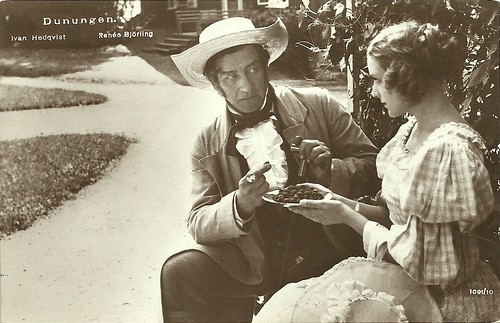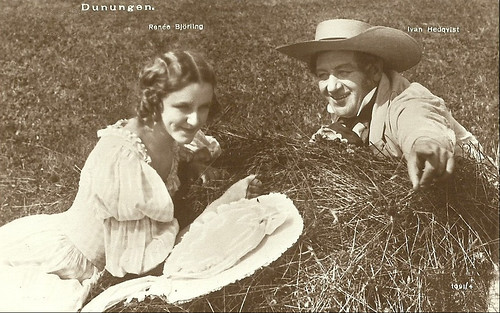
Swedish postcard by Axel Eliassons Konstförlag, Stockholm, no. 303. Ivan Hedqvist in Dunungen (Ivan Hedqvist, 1919).

Swedish postcard by Nordisk Konst, Stockholm, no. 1091/10. Ivan Hedqvist and Renée Björling in Dunungen/In Quest of Happiness (Ivan Hedqvist 1919), based on a novel by Selma Lagerlöf.

Swedish postcard by Axel Eliassons Konstförlag, Stockholm, no. 303. Photo: Skandia Film, Stockholm. Jenny Hasselquist and Ivan Hedqvist in the Swedish silent film Vem dömer/Love's Crucible (Victor Sjöström, 1922).
He returned with a bang as both the director and main male actor
Ivan Hedqvist was born Carl Ivan Engelbert Hedqvist in 1880 in Gottröra, Stockholm, in Sweden.
Hedqvist was first engaged at Hjalmar Selander's theatre company in 1901-1902. Then, engagements followed at the Swedish Theatre in Helsinki (1902-1904), the Stora Teatern in Gothenburg (1904-1906), the Swedish Theatre in Stockholm (1906-1909), and at the Dramatic Theatre (1909-1919). Then he returned to the Swedish Theatre in Stockholm (1922-1925), worked at the Oscar Theatre (1926-1927) and returned to the Dramatic Theatre (1927-1932).
Hedqvist was also engaged at the Skansen Open Air Theatre (1911-1913), where he later was a director (1914-1918). He made guest appearances in Oslo, Helsinki, and Gothenburg, and also undertook his own tours in the countryside. His roles included Oedipus, the King in 'Hamlet', Iago in 'Othello', Shylock in 'The Merchant of Venice', Tartuffe, Holofernes in 'Judith', Lövborg in 'Hedda Gabler', Maurice in 'Crime and Punishment', and Professor Higgins in 'Pygmalion'. In 1916, he was awarded the medal Litteris et Artibus. Ivan Hedqvist performed Alfred Tennyson's poem 'The New Year's Bell' at Skansen during the New Year's celebrations in 1917.
Ivan Hedqvist also devoted himself successfully to the cinema, first as an actor and later as a director. He started to act in film in 1910 at Svenska Biografteatern but after three films he stopped. In 1919 he returned with a bang as both the director and main male actor of the drama Dunungen (Ivan Hedqvist, 1919), also with Renée Björling, who is ordered by her fiancé to cheat on his uncle but instead she makes friends with him.
Hedqvist directed Björling again in Carolina Rediviva (Ivan Hedqvist, 1920), with himself in the male lead as a man who secretly cared for and funded a foundling. A third time he directed Björnling in Vallfarten till Kevlaar/The Pilgrimage to Kevelaar (Ivan Hedqvist, 1921), though not with himself acting in the film. In his final direction, Livet på landet/Life in the Country (Ivan Hedqvist, 1924), he had the male lead again, but this time with Mona Martenson as the younger woman.

Swedish postcard by Axel Eliassons Konstförlag, Stockholm, no. 84. Photo: Herm. Hamnqvist, 1911.

Swedish postcard by Axel Eliassons Konstförlag, Stockholm, no. 1441. Ivan Hedqvist in the play 'Mannen och hans öfverma' (Man and Superman) by George Bernhard Shaw, performed in 1907 at Svenska Teatern.

Swedish postcard by Axel Eliassons Konstförlag, Stockholm, no. 304.

Swedish postcard by Nordisk Konst, Stockholm, no. 1091/[invisible, possibly 3]. Ivan Hedqvist as Teodor and Renée Björling as Dunungen in Dunungen/In Quest of Happiness (Ivan Hedqvist 1919), based on a novel by Selma Lagerlöf. The lady on the left is Jenny Tschernichin-Larsson, who plays Teodor's mother.

Swedish postcard by Nordisk Konst, Stockholm, no. 1091/10. Ivan Hedqvist as Teodor and Renée Björling as Dunungen in Dunungen/In Quest of Happiness (Ivan Hedqvist 1919).
Undeservedly been neglected
Ivan Hedqvist also played many parts in films by others, such as the old master sculptor Anton in Victor Sjöström's period piece Vem dömer/Love's Crucible (Victor Sjöström, 1922). When in a mirror's reflection he sees his young wife - who hates him and has a lover - dropping poison in a glass for him, he has a stroke before she can kill him. Is she guilty of murder?
His other films included De landsflyktige/The Emigrants (Mauritz Stiller, 1921), Det omringade huset/The Surrounded House (Victor Sjöström 1922), Johan Ulfstjerna/Human Destinies (John Brunius, 1923) in which he had the title role, and Ingmarsarvet/The Ingmar Inheritance (Gustav Molander, 1925) also with Conrad Veidt, Lars Hanson and Mona Martenson, and its sequel Till österland/To the Orient (Gustav Molander, 1926).
From the mid-1920s Hedqvist acted in several German-Swedish films, shot in Germany, such as Die sieben Töchter der Frau Gyurkovics/A Sister of Six (Ragnar Hyltén-Cavallius, 1926). In return, he may have brought European actors working in Berlin to Sweden for the cast of Molander's Hon, den enda/She, the Only One (Gustav Molander, 1926) and Synd/Sin (Gustav Molander, 1928), Hedqvist's last silent film.
In 1930-1932 Hedqvist still acted in four Swedish early sound films, including Doktorns hemlighet (John Brunius, 1930), shot at the Paramount studios as the Swedish version of The Doctor's Secret, and with Pauline Brunius in the lead. His last part was in the drama Värmlänningarna/The Varmlanders (Gustaf Edgren, 1932). Ivan Hedqvist died in Stockholm in 1935. He was 55.
At the Swedish Film database, Magnus Rosborn pleas for recognition of Hedqvist's qualities as director: "Ivan Hedqvist is one of the filmmakers from the Golden Age of Swedish cinema who has undeservedly been neglected, largely because only two directors, Victor Sjöström and Mauritz Stiller, have been universally acclaimed in the versions of film history which have held sway until now. This is even though Hedqvist was often hailed as an outstanding filmmaker by his contemporaries and that at least two of his films, both thematically and in terms of production, are in line with what one associates with the Golden Age." He refers to Dunungen and Vallfarten till Kevlaar (1921), based on a poem by Heinrich Heine.

Swedish postcard by Förlag Nordisk Konst, Stockholm, no. 1116/4. Renée Björling in Carolina Rediviva (1920), directed by Ivan Hedqvist, who also played one of the leads
.

Swedish postcard by Axel Eliassons Konstforlag, no. 305. Photo: Skandia Film. Jenny Hasselqvist, Ivan Hedqvist, Tore Svennberg and Gösta Ekman in Vem dömer/Love's Crucible (Victor Sjöström, 1922). The film is a Renaissance drama where a young woman named Ursula (Hasselqvist), who is in love with Bertram, the son (Ekman) of the mayor (Svenberg), is accused of having poisoned her older husband, the sculptor Master Anton (Hedqvist). She has to prove her virginity through a fire test. The film's title translates as Who judges? NB Nils Asther had a small part in this film. He is the man just left of Hasselquist.
Sources: Paul Joyce (I thank you), The Swedish Film Database, Wikipedia (Swedish), and IMDb.
This post was last updated on 31 August 2024.
No comments:
Post a Comment